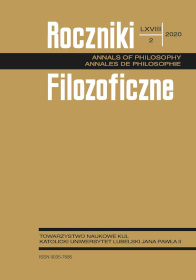The Three Faces of the Cogito: Descartes (and Aristotle) on Knowledge of First Principles
The Three Faces of the Cogito: Descartes (and Aristotle) on Knowledge of First Principles
Author(s): Murray MilesSubject(s): Philosophy, History of Philosophy, Epistemology, Ancient Philosphy, Renaissance Philosophy, Early Modern Philosophy
Published by: Towarzystwo Naukowe KUL & Katolicki Uniwersytet Lubelski Jana Pawła II
Keywords: cogito; first principles; intuitive induction; foundationalism; Cartesian Circle
Summary/Abstract: With the systematic aim of clarifying the phenomenon sometimes described as “the intellectual apprehension of first principles,” Descartes’ first principle par excellence is interpreted before the historical backcloth of Aristotle’s Posterior Analytics. To begin with, three “faces” of the cogito are distinguished: (1) the proto-cogito (“I think”), (2) the cogito proper (“I think, therefore I am”), and (3) the cogito principle (“Whatever thinks, is”). There follows a detailed (though inevitably somewhat conjectural) reconstruction of the transition of the mind from (1) via (3) to (2) and back again to (3). What emerges is, surprisingly, a non-circular, non-logical, and ultimately non-mysterious process by which first principles implicitly contained in a complex intuition are gradually rendered explicit (and, if abstract, grasped in their abstract universality). This process bears a striking family resemblance to that intuitive induction (“grasping the universal in the particular”) which Aristotle scholars have distinguished from empirical forms of induction.
Journal: Roczniki Filozoficzne
- Issue Year: 68/2020
- Issue No: 2
- Page Range: 63-86
- Page Count: 24
- Language: English

